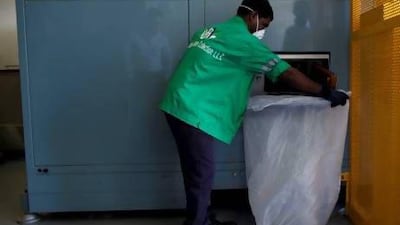An Abu Dhabi hotel is testing an innovative way to dispose of leftover food - by recycling it into fertiliser.
For the past 20 days staff at the Westin Abu Dhabi Golf Resort & Spa have been carrying out a trial of a new machine that uses extreme heat to shrink waste food to about a quarter of its original size. When shrunk, the recycled food can be used either as fertiliser by the hotel's gardeners or, hopes management, sold on to landscaping companies.
The machine, developed in Korea and supplied to the hotel by recycling company Union Paper Mills, enables the Westin to process its leftovers on site - rather than pay thousands of dirhams to send the waste to landfill, where its decomposition would release gases dangerous to the climate.
"So far the technology has proven to be excellent," said Sebastien Weyer, director of engineering at the hotel. "We are able to feed in a mass of food waste which is then turned into a sustainable product which is a fraction of the original size."
Before the experiment, food waste was mixed with the general waste produced at the hotel, said Mr Weyer.
Altogether, the volume of all the waste was 6.6 cubic metres a day. Since the new machine's arrival, the amount of waste produced by the hotel has shrunk to 5.5 cubic metres a day, he said.
The hotel started by collecting waste from the staff canteen. It found that in recycling a week's worth of the canteen's waste food the machine was able to produce about 280 kilograms of fertiliser.
From Saturday the hotel has been collecting all its waste food and feeding it into the machine.
The waste is collected throughout the day and stored overnight. Every morning, it is loaded into the waste processing machine where it is heated at 175°C for 10 to 12 hours.
"The treatment removes the moisture content from the food waste, reducing its volume," said Huzaifa Rangwala, the manager of marketing and contracts at Union Paper Mills in Dubai.
The machine, a metal box 3.6 metres long and two metres wide and high, is capable of handling 600kgs of food waste per cycle, said Mr Rangwala. The company has also developed smaller devices, capable of handling 100kgs per day, as well as larger ones with capacities of up to seven tonnes a day.
The process is not completely green - it requires up to 800 kilowatts of electricity per tonne of food waste processed.
"It consumes a lot of energy but if you compare this to the carbon footprint of waste trucks carrying the waste, it still offers a substantial saving," said Mr Rangwala.
It also cuts down on the methane produced by organic matter at landfills. Methane is more than 20 times more potent than carbon dioxide in terms of its greenhouse effect.
The Westin is currently using its recycled food for its own purposes. The hotel is establishing a small garden where basil, mint, coriander, chilly and other herbs will be grown. To improve the quality of the soil, gardeners have added the organic matter the machine has produced from the hotel's waste food.
The hotel has also commissioned tests of the material at a laboratory in Al Ain. Depending on the results, the hotel is hoping to sell the fertiliser to landscaping companies.
Rainer Wiegand, area director, operational innovation at Starwood Hotels Abu Dhabi, said the chain was considering introducing the machine to the rest of its properties.
"We are testing it here but we have seven sister hotels in Abu Dhabi alone," he said.
Other hotel chains and large retail facilities have also expressed interest in the machine, according to Mr Rangwala. A smaller machine is being tested at the Mirdif City Centre in Dubai.
Studies carried out by the Centre of Waste Management - Abu Dhabi in 2010 estimated that the emirate produces between 1.8kg and 2.4kg of waste per person every day, almost half of per capita output in the United Kingdom.
Under its current trajectory, the Government would be spending Dh22 billion on waste management a year in 2030. Food scraps are a significant source of this waste, particularly for hotels and restaurants.

